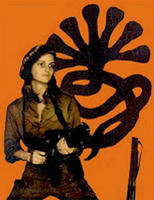

Hearst joined her captors; here holds an assault rife in front of the Symbionese Liberation Army (SLA) logo.
Charles Tart and The Day Newspaper Heiress Patty Hearst Was Kidnapped by The Symbionese Liberation Army
He didn't consider himself psychic, so at first he had little tolerance for his experience. On 4 February 1974 Dr Charles T. Tart was driving to a meeting with a colleague in Berkeley, California, and about to turn off San Pablo Avenue onto Ashby. He found himself thinking about bad neighborhoods with criminal gangs. He thought this silly as he was headed to a nice section of Berkeley. "The thought not only persisted, it quickly built into a frightening set of obsessions about being beaten up, about gangs of people with guns, shooting, violence, and the conviction that [he] would be mistaken for a burglar and shot. . . . [He] became very frightened and wanted to turn the car around and drive away as fast as possible." The closer he got to his destination, the worse he felt.
The fear intensified and he pulled over twice, about to make a U-turn and return home, but he refused to surrender to what he called "this craziness." He did reach his colleague but felt ashamed. They went to a coffee shop and nothing was said about it.
Some years later he received a letter from the colleague, then on the East coast. The man told him that "While he was waiting for me in front of the Institute, he started feeling paranoid, worrying about people with guns and getting shot! He too felt pretty silly and ashamed."
"The next sentence in his letter was the real shock, though. Had [Tart] known that the heiress Patty Hearst had been kidnapped, just down the street, a few minutes after we had left?"
Tart had fought off panic and his colleague felt paranoid a few minutes before nine in the morning, when three members of the "Symbionese Liberation Army, the SLA, had already kidnapped Peter Benenson, a mathematician at Berkeley's famous Lawrence Radiation Laboratory. He had gone grocery shopping at the Berkeley Co-operative Shopping Center on Shattuck Avenue, in the north end of town where [Tart] was coming from." The SLA members drove with Peter Benenson to Benvenue Avenue, where they parked.
"The two men each carried an automatic rifle containing cyanide tipped bullets, the woman waved a .38 automatic pistol. Benenson was in a state of terror for some time, as his car was driven around while he crouched on the floor. There was indeed plenty of fear and a gang with guns around for [Tart and his colleague] to pick up on!"
Looking for a parking place, Tart had driven up and down that section of Benvenue. He wonders if he drove past the SLA gang and if he walked right past them after he parked. He was frightened about armed gangs in cars. He knows for certain that if the SLA weren't there when he arrived, they were on their way.
Benenson's kidnappers parked his car in Patty Hearst's driveway. Armed with automatic rifles and pistols, they knocked on her apartment door. Her boyfriend, Steven Weed, opened it, whereupon they threw him to the floor, then beat and kicked him. Patty Hearst was grabbed and carried screaming from the apartment. A curious neighbor was beaten and knocked unconscious to the floor, already soaked in Weed's blood. Two women were driven back into their apartment by automatic rifle fire. The SLA gang sped off with Hearst panicked in the trunk, Benenson terrified on the back seat floor.
Tart realizes now that he was driving into danger and he says, "Part of my mind was telling me to get away. I misinterpreted it as my craziness. Luckily nothing worse happened to me or [my colleague] than fright and shame."
Of his experience, he says, "Now I wonder how many other people are tuning into the world around them this way and unnecessarily suffering because they think it's their own craziness? What could we be like if we could understand and deliberately use this kind of psychic sensitivity?"
This, and similar accounts can be found at TASTE (The Archives of Scientists' Transcendent Experiences), Dr Tart's web site.
Common sense has time compartmentalized into past, present, and future, but is it? In relation to Tart's experience, how can it be ? We speak of the unconscious mind, but is it merely an aspect of consciousness depending on circumstantial evidence? How, then, does consciousness depend on circumstantial evidence?
_________________________________
My comment: during that same event I lived only a few blocks away and hadn't a clue but I wasn't faced with any danger. I read about it in the newspapers.
